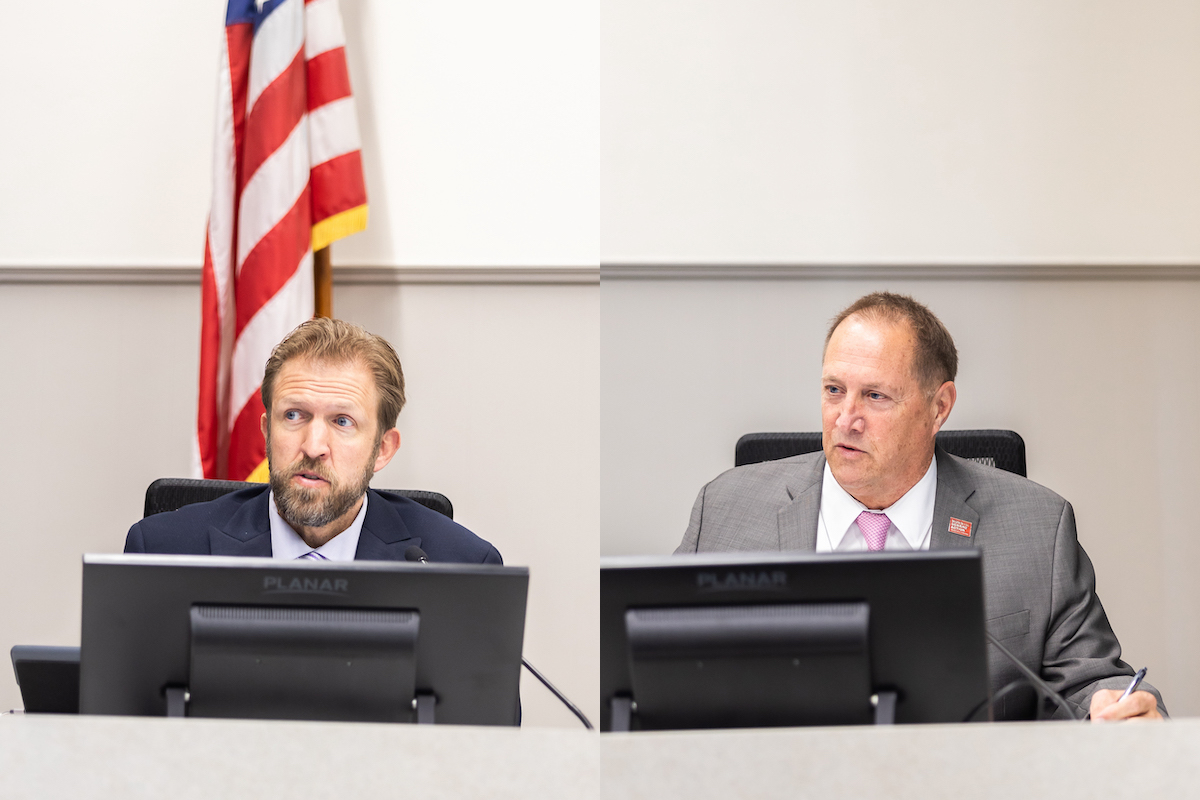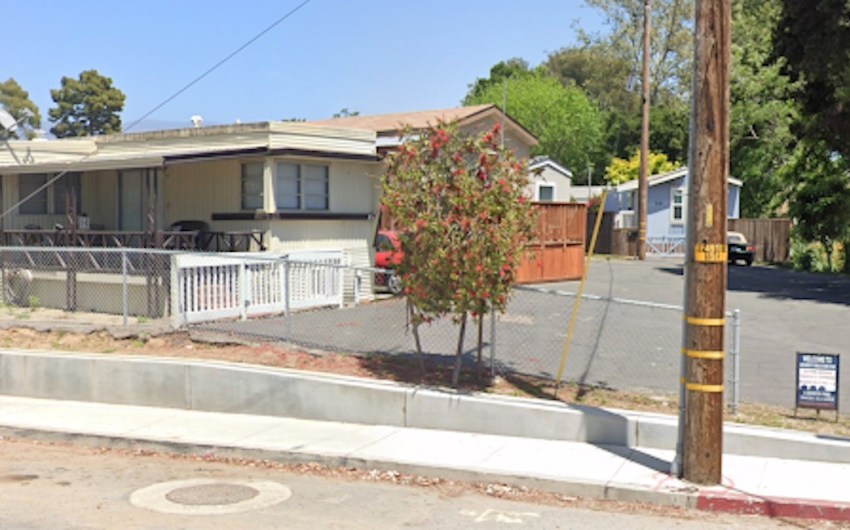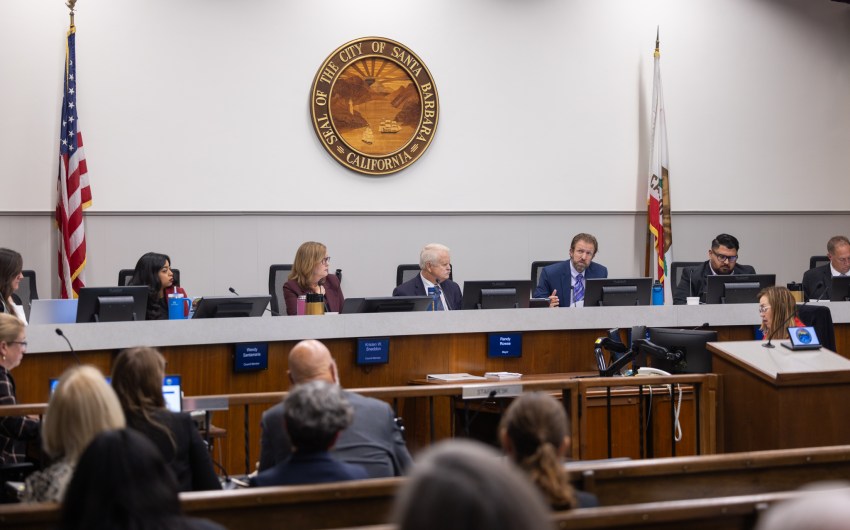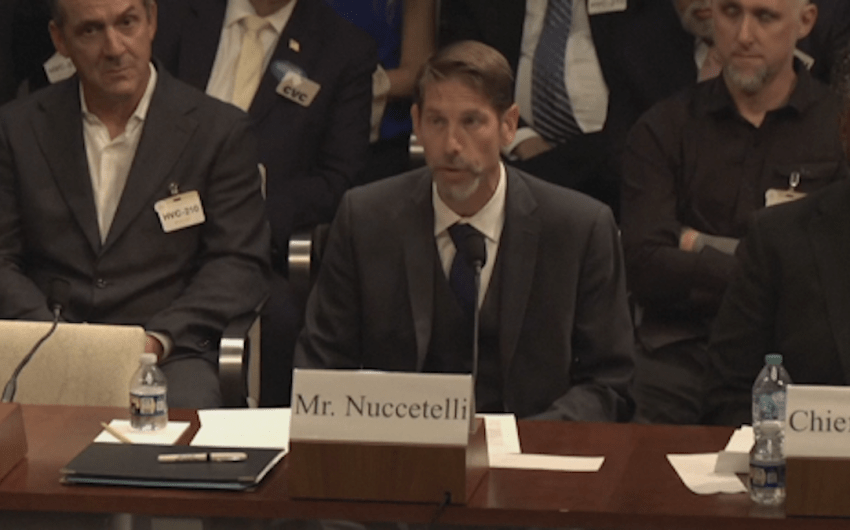In recent years, the City of Santa Barbara has experienced a boom in the number of short-term vacation rentals — with more than a thousand available at any given time — which continue to operate despite the fact that an overwhelming majority are unpermitted, untaxed, and technically illegal.
Last week, the City Council held an informal discussion, as requested by Councilmembers Mike Jordan and Eric Friedman, to dive deeper into how the city can continue to enforce penalties on the illegal operators, and whether it was time to consider a cap on rentals in the coastal zone and rethink the city zoning ordinances to ensure that short-term rentals don’t cut into the city’s already dwindling housing stock.
When City Planner Allison DeBusk presented a map of short-term rentals within Santa Barbara city limits at the meeting, city councilmembers were shocked by the image on the screen: Like an X-ray showing the spread of a deadly disease, the map was pockmarked with multicolored dots, each representing a vacation rental in the city, with almost all of the rentals falling outside the small strip of coastal zone and downtown neighborhoods where they are technically allowed. About 16 short-term rentals are legally permitted outside the coastal zone, while an estimated 1,150, according to the city’s newly instituted Short-Term Rental Enforcement Program, remain unpermitted and, even worse to those at City Hall, untaxed.
Councilmember Jordan said that the proliferation of short-term rentals have crept into residential neighborhoods meant for single and multifamily housing, bringing with them more noise and traffic while slowly eroding the neighborhood feel by replacing long-term residents with visitors and driving up rent prices.
And now that the city has already begun to tackle the problem with its first-ever short-term rental enforcement program, city officials are seriously considering other options to take on the lack of oversight and conflicts with current zoning to protect the housing stock for long-term renters.
The short-term rental enforcement program was originally a temporary pilot program, but after much success in its first year — the small team brought in nearly $600,000 in back taxes, penalties, and fines while only spending $100,000 of its million-dollar budget — the City Council decided back in April to expand it into a permanent program going forward.
Several councilmembers supported the idea of a “homeshare program,” which was described by Councilmember Friedman as an above-board pathway to allowing residents to offer their homes, or a room in their home, as a short-term rental. This would help carve out an exception for certain property owners, such as seniors and teachers, who have taken to listing their homes as vacation rentals in order to make ends meet. Allowing the homeshare program could help ensure that hosts are city residents who understand their neighborhoods and would be accountable to their community, Friedman said.
During public comment, some city residents shared their experiences living next to short-term rentals, while some vacation rental hosts warned the council that limiting or banning short-term rentals would cut off an entire portion of visitors who couldn’t otherwise afford to stay in Santa Barbara’s pricey hotels.
One homeowner, who lives in the Shoreline neighborhood directly next door to a short-term rental, said that the visitors are often loud, playing house music at all hours of the night and partying in a hot tub located just six feet away from his own property. And while this behavior is suitable for a hotel fully staffed to deal with complaints, it has a larger impact in smaller neighborhoods with families and children, where noise complaints are treated as low priority for law enforcement.
“It’s a neighborhood; it’s not the pool deck at the Flamingo in Vegas,” the homeowner said.
Others asked that the council consider alternatives, like a partnership with Airbnb or VRBO, which would require hosts to post permit numbers on the online listing. This requirement has helped with compliance in nearby cities such as Goleta, Carpinteria, and Ventura.
Some city residents argued that the popularity of the vacation rentals is in itself proof that they are needed, especially for those who either can’t pay for a hotel or prefer the more “homey” accommodations of a short-term rental.
The council was generally in support of limiting short-term rentals, though there was some uncertainty over how the city could enforce the “free-for-all” that currently exists outside the coastal zone, and whether the California Coastal Commission would go along with a city attempt to cap the number of coastal vacation rentals.
Historically, the Coastal Commission has supported short-term rentals in the coastal zone, though Councilmember Meagan Harmon — who has sat on the commission since 2021 — said that the group’s priorities have drastically shifted toward protecting housing. And while in the past, the commission may have leaned toward preserving vacation rentals, Harmon said now may be the perfect time to gauge the commission’s interest in a change.
“I really hope we can take something to the commission,” Harmon said. “Right now is a good time to go.”
And while the City Council is in agreement that vacation rentals have caused severe impacts in almost every district, the real question remains whether the city has the bandwidth to tackle enforcement for all of the illegal short-term rentals.
City Administrator Kelly McAdoo said that the conversation was a good first step to taking on the problem, though a complete ban might present “significant enforcement challenges” without additional staff and resources to manage the program.
Mayor Randy Rowse suggested starting with the city’s zoning code. He said the community needs and deserves consistency so that people can be certain that residential neighborhoods will be for residential, and areas zoned for hotels and lodging would be the proper place for short-term rentals.
That could mean prohibiting short-term rentals in high fire zones, on properties with rental units, places with affordable housing, any properties with an accessory dwelling unit, or any that have open enforcement cases.
The next step would be for the council to return with an outline for potential changes to the city’s zoning ordinance or short-term rental enforcement policies, though there is not a date set for further discussion.
“The longer we wait to do something, the worse it’s going to get,” Jordan said.
Premier Events
Sun, Jan 11
3:00 PM
Santa Barbara
Mega Babka Bake
Sat, Jan 03
7:00 PM
Santa Barbara
Nic & Joe go Roy
Sat, Jan 03
8:00 PM
Santa Barbara
No Simple Highway- SOhO!
Sun, Jan 04
7:00 AM
Solvang
Solvang Julefest
Mon, Jan 05
6:00 PM
Goleta
Paws and Their Pals Pack Walk
Mon, Jan 05
7:00 PM
Santa Barbara
Ancient Agroecology: Maya Village of Joya de Cerén
Tue, Jan 06
7:00 PM
Santa Barbara
Amazonia Untamed: Birds & Biodiversity
Wed, Jan 07
7:30 PM
Santa Barbara
SBAcoustic Presents the John Jorgenson Quintet
Thu, Jan 08
5:30 PM
Santa Barbara
Blueprints of Tomorrow (2026)
Thu, Jan 08
6:00 PM
Isla Vista
Legal Literacy for the Community
Thu, Jan 08
7:30 PM
Santa Barbara
Music Academy: Lark, Roman & Meyer Trio
Sun, Jan 11 3:00 PM
Santa Barbara
Mega Babka Bake
Sat, Jan 03 7:00 PM
Santa Barbara
Nic & Joe go Roy
Sat, Jan 03 8:00 PM
Santa Barbara
No Simple Highway- SOhO!
Sun, Jan 04 7:00 AM
Solvang
Solvang Julefest
Mon, Jan 05 6:00 PM
Goleta
Paws and Their Pals Pack Walk
Mon, Jan 05 7:00 PM
Santa Barbara
Ancient Agroecology: Maya Village of Joya de Cerén
Tue, Jan 06 7:00 PM
Santa Barbara
Amazonia Untamed: Birds & Biodiversity
Wed, Jan 07 7:30 PM
Santa Barbara
SBAcoustic Presents the John Jorgenson Quintet
Thu, Jan 08 5:30 PM
Santa Barbara
Blueprints of Tomorrow (2026)
Thu, Jan 08 6:00 PM
Isla Vista
Legal Literacy for the Community
Thu, Jan 08 7:30 PM
Santa Barbara


























